 Petzlover
Petzlover Both American Wirehair and Serengeti are originated from United States. Both American Wirehair and Serengeti are of same weight. Both American Wirehair and Serengeti has almost same life span. Both American Wirehair and Serengeti has same litter size. Both American Wirehair and Serengeti requires Low Maintenance.
Both American Wirehair and Serengeti are originated from United States. Both American Wirehair and Serengeti are of same weight. Both American Wirehair and Serengeti has almost same life span. Both American Wirehair and Serengeti has same litter size. Both American Wirehair and Serengeti requires Low Maintenance.
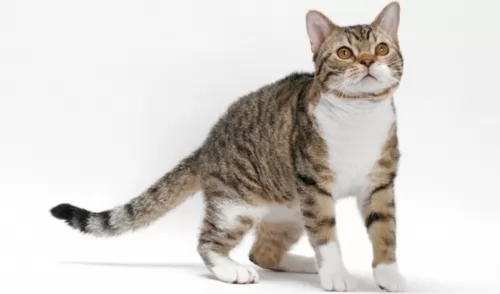 The American Wirehair started as a spontaneous mutation so that somewhere along the line, an unusual litter with this unique wiry type of fur was born.
The American Wirehair started as a spontaneous mutation so that somewhere along the line, an unusual litter with this unique wiry type of fur was born.
The cat hails from New York and it was in 1966 that a couple of barn cats had a litter of kittens, some of which were born with this peculiar wiry hair. Only one kitten survived – a male – and later it was discovered that the gene responsible for the wirehair coat was dominant so that only one parent required the gene to produce Wirehair offspring.
Today, all American Wirehairs are descendants of this one surviving male kitten. Today the breed is still fairly rare. It is, however, recognized by the four largest North American cat associations.
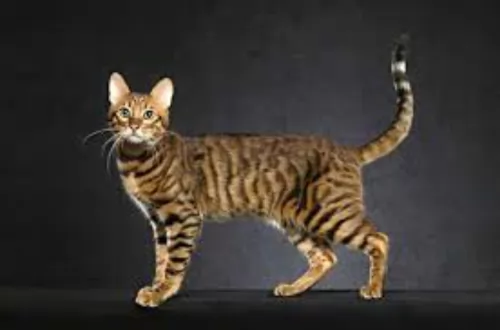 This is a cat breed that was deliberately bred to resemble the Serval cat. It was developed by crossing a Bengal cat and an Oriental Shorthair.
This is a cat breed that was deliberately bred to resemble the Serval cat. It was developed by crossing a Bengal cat and an Oriental Shorthair.
The cat was developed by biologist Karen Sausman in California in 1994. The breed is still under development.
The idea with this hybrid cat was to produce new domestic cat breed that would look like a wild cat but not have the wild characteristics.
The cat is recognized by TICA – The International Cat Association.
 The American Wirehair is a medium-sized cat, strong and powerful, and can weight 5, 6 or 7 kg.
The American Wirehair is a medium-sized cat, strong and powerful, and can weight 5, 6 or 7 kg.
The head is in proportion to the body and the cat has a strong muzzle and chin. The ears are medium-sized and are rounded at the tips while the eyes are large, round, and set well apart.
It’s the coat that draws attention as unlike a regular cat’s silky fur, the fur of this cat is springy, coarse and wiry to the touch. The coat can be any color or pattern. It is the cat’s very coat that distinguishes it from all other breeds.
With this coat, the less grooming the better. Brushing or combing can damage it, so unless he is shedding heavily, leave it alone.
The only other care he needs really is nail trimming, to check inside his mouth for bad teeth and to also check inside his ears for redness. Both the teeth and the ears can be a source of pain for your pet.
The American Wirehair may have a harsh coat but there is nothing harsh about his personality at all. He is amicable and loving, getting on well with all members of his human family.
He is an independent cat and while he loves spending time with his family, he is quite capable of spending time on his own as well.
The American Wirehair is a playful cat so you want to give him some toys to entertain himself for when you’re not around.
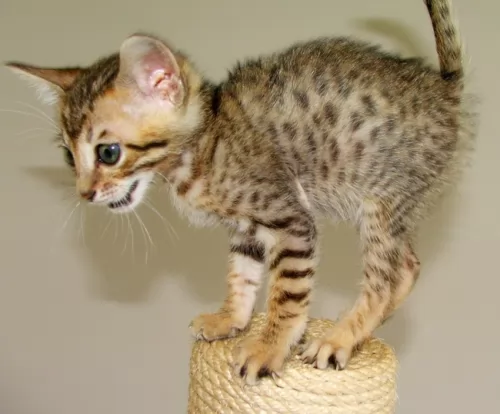 These are spotted cats with long legs and large, round-tipped ears. The neck is long and the body lithe, lean, and muscular.
These are spotted cats with long legs and large, round-tipped ears. The neck is long and the body lithe, lean, and muscular.
They are medium to large in size and can weigh up to 7 or 8kg. The coat is tan and cream with silver or grey coloring as well as black spots and stripes. Some Serengetis appear to be black but on closer look, you see that they have what is known as ‘ghost spotting’ – a black-spotted pattern that can scarcely be seen.
You may even think you are looking at a black panther. The coat is short, silky, smooth, and sleek. The eyes of the cat are round and are usually amber or gold.
The Serengeti is a friendly, social, and confident cat that is quite capable of forming a strong attachment to its human family. It is a loving, loyal cat. The cat can become bored and will need plenty of puzzle toys to keep his mind and body physically active.
You will need to provide him with a scratching post too as he is a lively, energetic cat. This isn’t only an indoor cat. Cats like the Serengeti will need an outdoor enclosure and the Serengeti cat will need branches and perches to leap up onto.
He is an active cat and can become bored if left indoors. They are capable of making a good family pet and are vocal too – telling you all sorts of things.
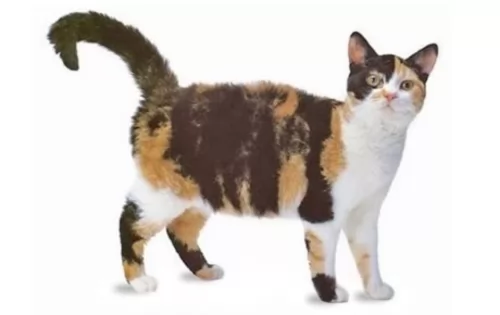 The American Wirehair makes a splendid pet, and while he isn’t the best breed for children, he can make a good pet with those children who have been taught kindness, gentleness and respect for animals.
The American Wirehair makes a splendid pet, and while he isn’t the best breed for children, he can make a good pet with those children who have been taught kindness, gentleness and respect for animals.
He is calm, quiet, dependent, and sociable and by providing him with a good home, he’ll prove to be a wonderful pet and companion.
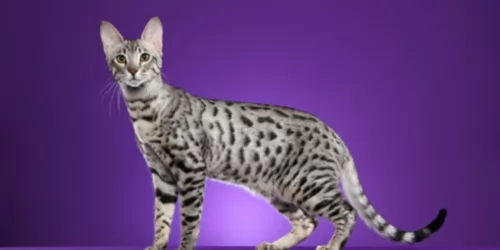 The Serengeti is both a friendly and affectionate cat even though he is a bit shy and overwhelmed in new surroundings.
The Serengeti is both a friendly and affectionate cat even though he is a bit shy and overwhelmed in new surroundings.
He is a cat that talks quite a bit and if he is happy and content he enjoys 'chatting' to you about his day.
He is able to get on well with children in the home as well as with other pets. He is an athletic cat and just loves to climb, and this is why he will certainly need an outdoor enclosure as he loves to dart around madly from time to time, and doing that in your home could be quite dangerous.
He is capable of being a loving cat breed and can form a strong bond with his human family.
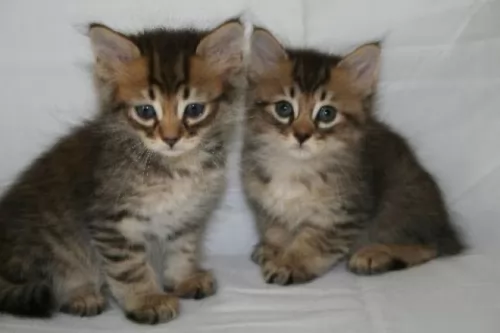 The American Wirehair is a healthy type of cat but any cat can develop health issues.
The American Wirehair is a healthy type of cat but any cat can develop health issues.
Be aware of Hypertrophic cardiomyopathy – a common form of heart disease in cats where there is the thickening of the heart muscle.
Be careful of overfeeding your cat as obesity is a major contributory disease to many illnesses that a cat gets. Excess weight can contribute to diabetes and arthritis and put pressure on your cat’s joints. Certainly, carrying extra weight can shorten your cat’s life. Make sure your cat gets smaller, healthier meals and that he is active and exercised.
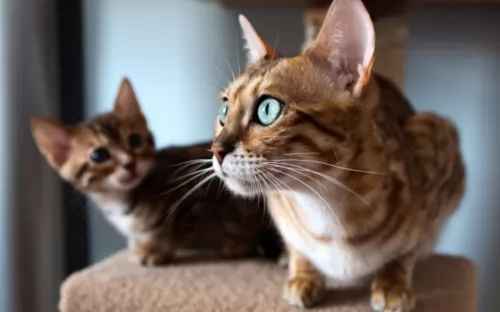 Hybrid Cats such as the Serengeti are a combination of a wild breed and a domestic breed. With good care he can live to be up to 15 years of age and possibly longer.
Hybrid Cats such as the Serengeti are a combination of a wild breed and a domestic breed. With good care he can live to be up to 15 years of age and possibly longer.
Hybrid cats are always controversial because people who have owned them have got both good and bad to say about them. They have some behavioral issues and many of them have an aggressive side, they’re aloof and they refuse to use a litter box. The cat can’t be blamed though because they have that wild side.
They also come with some health issues such as premature birth, miscarriage, diarrhea, and irritable bowel disease. You may just find yourself more often at the vet than you’d like.
You will need to ensure that your Serengeti gets all his vaccines and de-worming treatments.
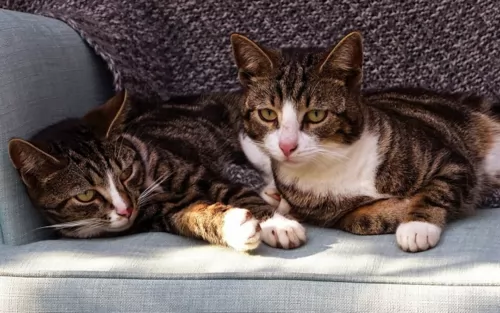 Brush the cat gently once a week. Your cat will love the connection you and he has. While you brush him, make a point of checking inside his ears and inside his mouth as well. It is also time to trim his nails. If you are hesitant to do this, ask you vet for suggestions or you can make use of a pet groomer too.
Brush the cat gently once a week. Your cat will love the connection you and he has. While you brush him, make a point of checking inside his ears and inside his mouth as well. It is also time to trim his nails. If you are hesitant to do this, ask you vet for suggestions or you can make use of a pet groomer too.
Make sure your pet cat is free from parasites such as fleas, ticks and heartworm. Your vet can recommend a treatment and it is also a good idea to talk to your vet about vaccines for your cat.
Have your American Wirehair spayed or neutered to prevent unwanted kittens and to promote better health for your cat.
Always choose healthy food for your pet, bearing in mind that cats are carnivores, which means that you need to choose cat-food for your pet that has fish and meat in it. It can be difficult making good homemade food for your cat but there are excellent commercially prepared cat foods to ensure your cat gets the correct balance of nutrients and calories. Bear in mind that your cat's nutritional requirements change through their different stages of life.
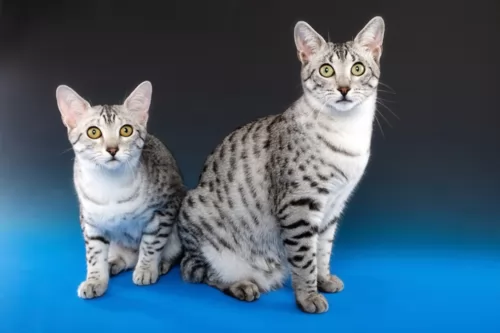 Grooming is easy for the Serengeti as it is a short-haired cat and will require a brush just once a week. Trimming the claws will also be necessary.
Grooming is easy for the Serengeti as it is a short-haired cat and will require a brush just once a week. Trimming the claws will also be necessary.
A cat such as the Serengeti has been developed by crossing the domestic cat with a wild breed. This means that there will be concerns with the temperament and behavior of these cats in a home setting. Apart from being allowed indoors, they will need an outside enclosure.
Having a wild side, while every cat is a carnivore, these cats are even more so. Their diet has to be strictly protein – meat. Wild cats would have a diet made up of birds and lizards. You want to avoid commercial cat foods that are of lower quality and have less meat in and more carbohydrates. This just spells ill health for your cat. Cats also need some fresh raw meat in their diets.
It is important to keep up your Serengeti's veterinary checkups to make sure there aren’t any health concerns.